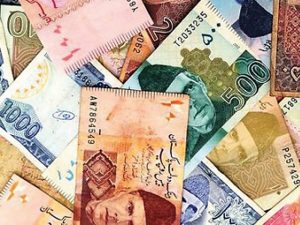Rs220 billion holes exposes against FBR’s target.
The target was not met as a result of bad tax planning, the precarious position of the economy, stagnant economic growth, and tax exemptions granted to traders.

ISLAMABAD: The government expects to experience a record shortfall of about Rs220 billion during the first half of the fiscal year as a result of contractionary economic policies, exemptions for traders, and legally dubious revenue measures. As of Friday, the tax collection stood at just Rs3.4 trillion.
The Federal Board of Revenue collected Rs3.4 trillion as of Friday compared to the target of Rs3.65 trillion for the July–December period, falling far short of the objective by a historical margin.
As a result of the government forcing commercial banks and tax offices to stay open on Saturday—a holiday—in anticipation of huge slippages, it now anticipates increasing the collection by an additional Rs20 billion to Rs25 billion. This includes the Government Holding Company’s about Rs 8.5 billion payment, which includes the super tax that the Sindh High Court has ruled unconstitutional.
The FBR could only collect Rs713 billion up to Friday, falling short of the massive Rs965.2 billion monthly target. The tax officials anticipate being able to make up the difference in the second half. However, it might provide the International Monetary Fund justification to compel Pakistan to enact new tax laws. Some FBR employees think they can raise the monthly collection to Rs. 740 billion by Saturday night.
Still roughly Rs220 billion in collection deficiencies would put the administration under further pressure because they will have a negative impact on the primary budget surplus goal for the first half.
The FBR missed the objective for a variety of reasons, including bad tax planning, a weak economy that forced the government to stifle economic growth, and providing tax exemptions to traders.
Although only 2% economic growth is anticipated, the inflation rate of roughly 25% is a major factor in increased revenue collection following income tax receipts.
The income tax collection showed the most astonishing development, increasing by over half during the first half despite the absence of important tax measures. Additional income tax reforms included in the budget were a significant contributing factor.
According to preliminary data, Rs3.4 trillion was collected, up from Rs2.92 trillion in the same time the previous year. This is an increase of more than 16.5%, according to FBR officials. However, the growth was less than the current inflation rate of 25%, which the FBR needs to address.
In addition, the FBR has provided refunds of Rs. 175.5 billion compared to Rs. 149 billion last year.
According to the FBR, the provisional tax collection for December 2022 totaled Rs713 billion, a 19% increase over the collection of Rs601 billion in December 2021.
In order to collect Rs7.470 trillion in taxes for the current fiscal year, there must be a 21% increase in taxes collected from the prior year. The government increased taxes by approximately Rs 1 trillion in the FY23 budget due to the petroleum levy, income tax, sales tax, and federal excise duty.
For the sixth straight month, customs duty collection fell short of expectations. Even less customs duty was collected by the FBR this year than it was the previous year, at Rs465 billion.
The FBR collected 82 billion rupees in customs duties in December, falling short of the goal by 24 billion rupees. On Saturday, custom duty collections are anticipated to reach another Rs3 billion (today). Additionally, the monthly collection was 10% less than in the preceding month.
The main cause was the limitations placed on imports, which decreased by more than 20% during the current fiscal year. Due to higher income tax collections and lower imports, the percentage of all taxes at the import stage has decreased below 43% to Rs1.44 trillion.
The amount of income tax collected in six months was Rs1.5 trillion, an increase of Rs481 billion or 48%. The collection fell Rs 44 billion shy of the goal, though. This was due to taxation policies that were morally dubious, such as the presumed income tax on real estate and the 10% super tax on businesses’ and individuals’ prior fiscal year revenue.
Even after the super tax was invalidated by the Sindh High Court, the government nonetheless required publicly traded state-owned businesses like the OGDCL to pay it. Since it involves the shareholders’ money, the Securities and Exchange Commission of Pakistan should look into this.
Due to flawed tax policies, the FBR only collected 401 billion rupees in income taxes in December, falling record-below the monthly target by a whopping 145 billion rupees. The capital value tax on the offshore assets was barely collected at Rs235 million—another poor tax policy. Nevertheless, the FBR reported a month-over-month rise in income tax collection of 55%.
Only Rs1.27 trillion in sales tax was collected in six months, which is Rs5 billion less than it was during the same period the previous fiscal year. The FBR has failed miserably by failing to capitalise on the nation’s 25% inflation rate. In its large 21,000-person workforce, FBR lacks sales tax specialists.
The FBR fell Rs106 billion short of its goal for collecting sales tax during the previous six months. The FBR missed the monthly target by Rs71 billion in December, pooling Rs202 billion under the sales tax head. Additionally, the monthly collection was down 11%.
The federal excise duty collection was Rs 164 billion, falling short by Rs 16 billion of the six-month goal. When compared to excise duty revenues during the same time period the previous fiscal year, the collection increased by 12%. The FBR fell Rs13 billion short of the monthly excise duty goal.










































